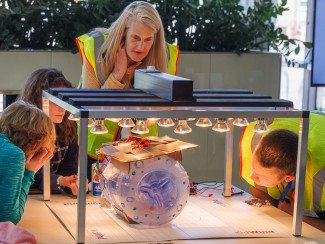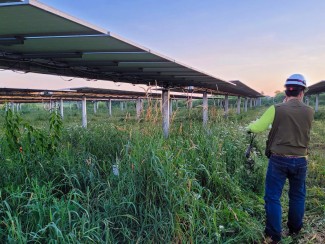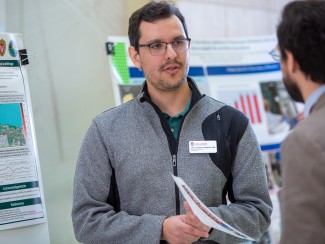Sen. Duey Stroebel says it’s “only a matter of time” before his vision of community solar is passed into law in Wisconsin, though he concedes that’s not likely this legislative session.
Sen. Duey Stroebel says it’s “only a matter of time” before his vision of community solar is passed into law in Wisconsin, though he concedes that’s not likely this legislative session.
“My main goal, frankly, is to create some competition in the area of our power source in Wisconsin,” the Saukville Republican said in a recent interview.
Alongside Rep. Scott Krug, R-Nekoosa, and other co-sponsors, Stroebel last year introduced legislation that would allow third-party-owned community solar projects in the state. Under the bill, these smaller solar fields would be created by developers only after local officials have approved the project, he explained.
Using transmission lines of existing energy providers but paying for the cost of transmitting the power themselves, these community solar owners could sell subscriptions to the project to customers in the community, according to Stroebel. Those customers would then get a credit on their electricity bill.
“But the only way they’re going to fill these subscriptions is if they can actually price their power at a rate cheaper than what the investor-owned utilities that are so predominant throughout the state of Wisconsin,” Stroebel said. “If they can generate their power more cheaply, then people will buy subscriptions and they will be able to enjoy the benefits of green energy.”
If these subscriber organizations aren’t able to do that, he expects consumers won’t pay more than what the large utilities charge, calling it a “market-driven” solution to reducing energy costs.
Utilities in the state have taken a stance against the bill. The Wisconsin Utilities Association argues it would benefit out-of-state community solar developers at the expense of customers who aren’t subscribed to the projects.
“The developers would benefit from using Wisconsin’s electric grid with no obligation to maintain service and reliability, to prove the generating asset is necessary or cost effective, or to be a provider of last resort, as Wisconsin’s utilities are required to do,” the group said last year in a statement on the bill.
Meanwhile, utilities have been forging ahead with their own version of community solar, with Madison-based Alliant Energy yesterday announcing its Cedar Rapids Community Solar garden in Iowa has begun generating energy for more than 300 customers.
But Stroebel argues utilities have “hijacked that terminology” by calling their solar fields community solar projects.
“What they’re doing isn’t community solar,” he said. “It’s investor-owned power generation. It’s paid for by the stockholders of that company. It does not have anything to do with the power rate that’s paid. They still charge the exact same amount, whether it’s generated by a coal plant, a gas plant or a solar field.”
By contrast, he says community solar requires private capital and must be cost-competitive and market-based.
In a recent column posted to WisOpinion.com, WalMart Director of Public Affairs Lisa B. Nelson called on state legislators to pass the Assembly and Senate versions of the community solar bill. She argues the move will attract investment to the state, create new jobs, reduce utility investment requirements and related rate increases.
“Community solar is a solution that brings a plethora of benefits to a broad base of consumers, transforming the way we access and think about energy, as well as reduce energy costs for Wisconsin families and businesses,” Nelson wrote.
The legislation was referred to the Senate and Assembly utility committees last year. And though Stroebel argues “there’s still energy behind the bill,” he’s not confident it will go all the way this session.
“Do I think the odds are real good for passing this session? Probably not,” he said. “But put it this way, this session, this bill has gone much further and received much more broad support than it ever has in the past … from the agricultural community to the business community.”
See bill details.





